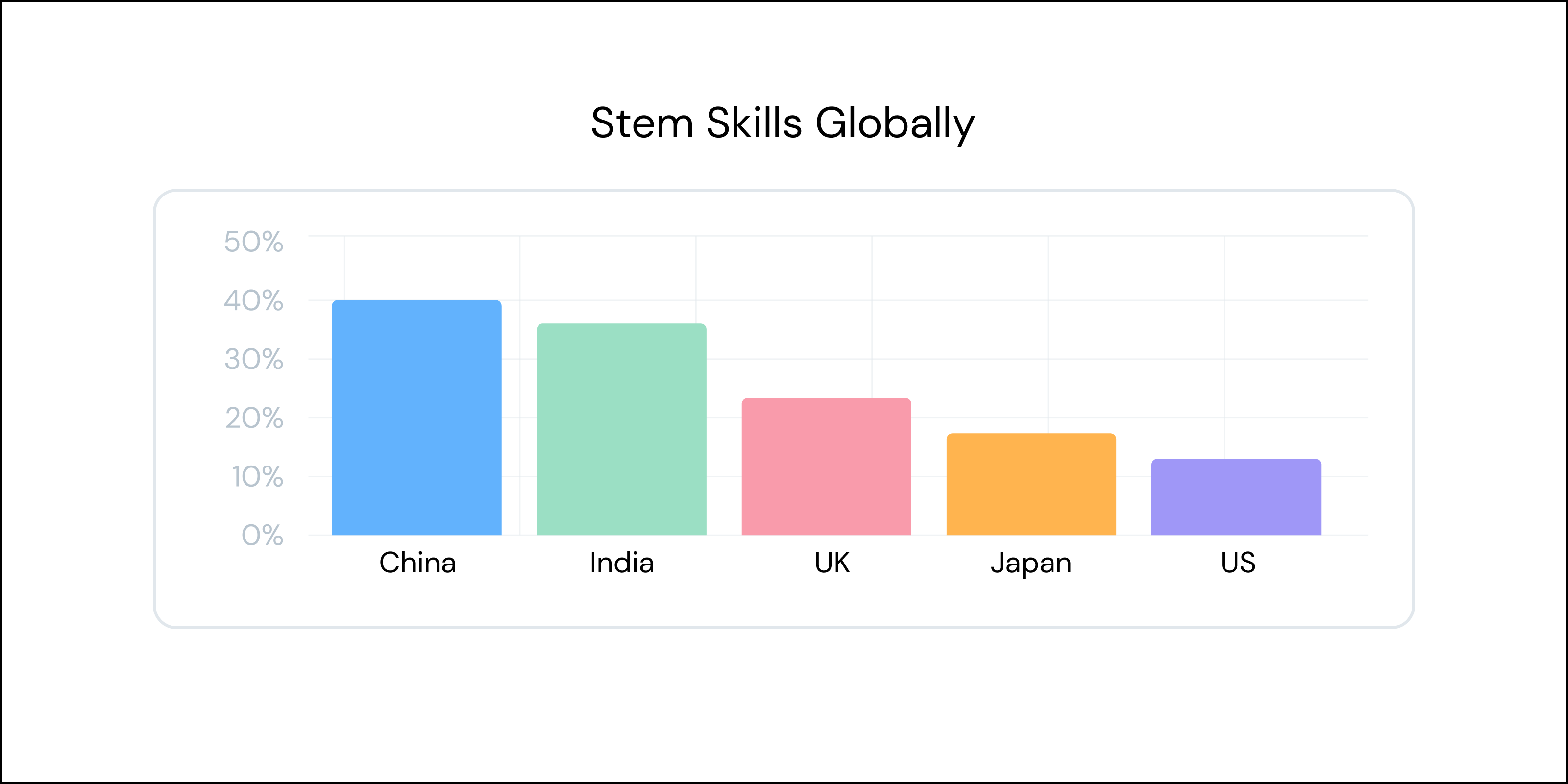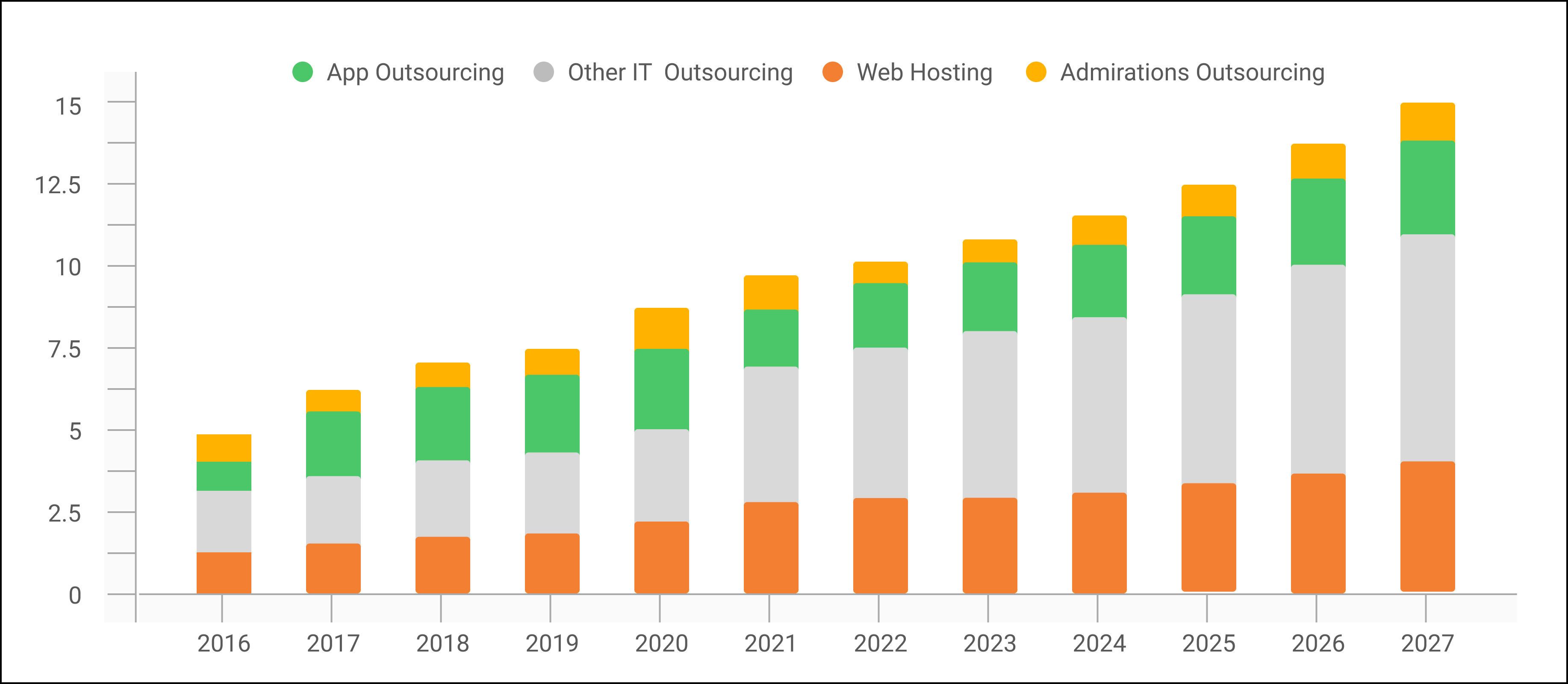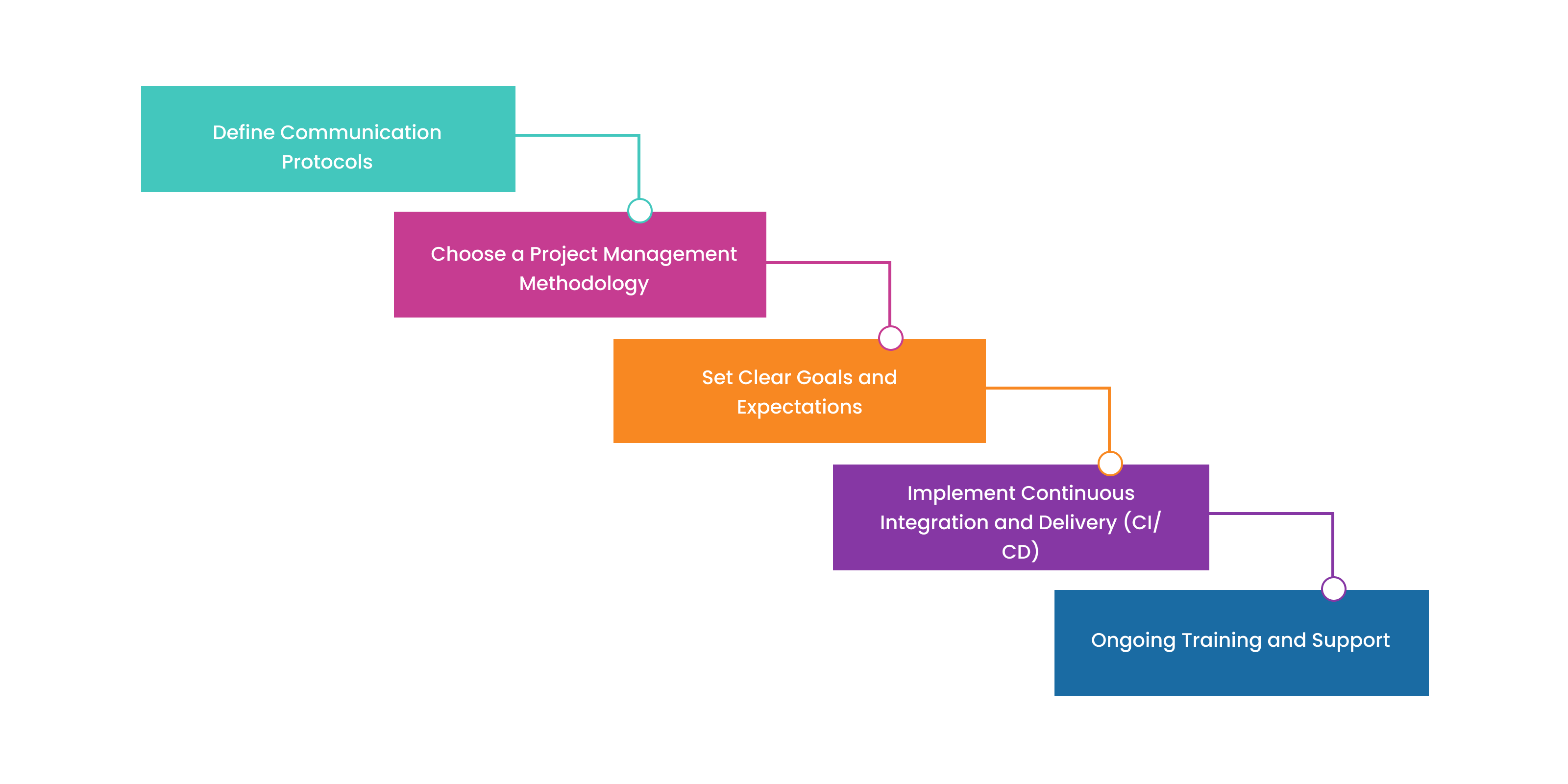How to Set Up an Offshore Team in India

Firms worldwide have long favored offshoring software development services from India for several compelling reasons.
Chief among them is the cost-effectiveness of services provided, making it an attractive option for businesses seeking quality solutions at competitive prices.
Additionally, Indian software development firms are highly sought after due to their reputation for delivering exceptional results, evident in their successful completion of numerous projects for clients both within and outside India.
The increasing demand for dedicated offshore software developers

Credits: Statista
The demand for Indian offshore developers continues to rise steadily, with major multinational corporations like Deloitte confirming that a significant portion, approximately 60%, of large organizations outsource their software development needs to India.
Amongst all the IT services, there has been a subsequent rise in the demand for mobile and web software developers.
Read our blog on offshoring mobile app development, to know how and why the offshoring model for hiring someone from a different country for mobile app development is adopted worldwide.
What makes Indian software developers so special?

Credits: Statista
Firstly, a vast majority of the Indian population possesses a decent command of the English language, facilitating smooth communication with clients globally.
Furthermore, India produces a large pool of STEM graduates, with approximately 1.6 million students graduating annually with expertise in software development, owing to the emphasis on STEM education in the country.
Future predictions for Indian software development
- Projections for the Indian outsourcing market are optimistic, with revenue expected to exhibit a healthy yearly growth rate, reaching a market volume of US$12.47 billion by 2027, according to reliable sources.
- Looking ahead, it is predicted that over 40% of IT professionals in India will undergo training in high-demand technological stacks over the next four years to meet the evolving needs of the industry.
- Additionally, the Indian government's proactive efforts, such as the launch of the Indian AI Mission, underscore the country's commitment to becoming a global hub for AI development.
Why hire an offshore team?
An offshore software development team is a group of specialists based in a different nation or area than the company's headquarters that work remotely on various projects. This agreement enables organizations to tap into a global personnel pool, bringing varied skill sets and experiences beyond geographical boundaries.
Check out our guidebook on outsourcing models to learn about an offshoring model in detail.
The primary argument for offshore software development is cost reduction, as many nations have cheaper labor expenses than their Western counterparts.
Furthermore, offshore development teams offer scalability and flexibility, allowing firms to dynamically adjust their workforce to changing project demands.
Leveraging time zone differences, offshore developers facilitate round-the-clock development cycles, accelerating project timelines and reducing time-to-market.
Furthermore, outsourcing provides access to specialized expertise, alleviating talent shortages and allowing businesses to carry out complicated projects more effectively, eventually increasing competitiveness and boosting innovation.
How to build your offshore team in India?
Considering that your client base is majorly foreign companies or Indian companies operating from an offshore development center, Here's a refined approach to forming your team and a detailed overview of the frameworks mentioned:
Identify client needs:
Understand the specific requirements of your foreign clients, including the technologies and frameworks they prefer for their projects. Tailor your hiring process to recruit developers proficient in these technologies.
Recruitment process:
Hire offshore developers with expertise in the required tech stack and frameworks. Conduct thorough interviews and technical assessments to ensure their skills align with the project requirements.
Roles needed in an offshore development team
Project manager
The project manager is responsible for overseeing the entire software development process, from conception to delivery.
They organize work, assign resources, and make certain that projects are finished on schedule and within budget.
Their responsibilities include establishing project objectives, developing timetables, managing stakeholder expectations, and addressing any difficulties that emerge throughout development.
A good project manager has excellent communication, leadership, and problem-solving abilities, as well as a thorough grasp of project management approaches such as Agile or Scrum.
An ideal project manager should have a basic knowledge of building and maintaining a management system for inventory, sales tracking, and internal employee management.
To know more about how to build an inventory automated track record, refer to the guide to building inventory management system.
Front-end developer
Frontend developers design and develop the user-facing interfaces of software programs. They employ HTML, CSS, and JavaScript to create visually beautiful and responsive websites. Frontend developers collaborate with UI/UX designers to transform design mockups into usable user interfaces.
They also ensure cross-browser compatibility and enhance speed to provide a consistent user experience across all devices and platforms.
Demand for front-end developers for increasing expectations for a good UI/UX is increasing. But how much can a front-end developer benefit from this?
To know more, read our blog on demand for front-end developers.
Back-end developer
Backend developers focus on the server-side logic and database management of software applications.
They utilize computer languages such as Python, Java, PHP, and Node.js to create and manage the server, store and retrieve data, and apply business logic and algorithms.
Backend developers provide APIs (Application Programming Interfaces) to enable communication between frontend and backend systems while maintaining data integrity and security.
Read more on the essence of building a strong backend system.
UI/UX designer
UI/UX designers are in charge of building intuitive and visually appealing user interfaces that improve the overall user experience.
They work with stakeholders to better understand user needs and requirements, perform user research, and design wireframes, mockups, and prototypes.
UI/UX designers focus on usability, accessibility, and aesthetics, ensuring that software interfaces are intuitive, engaging, and easy to traverse.
They also assess usability and iterate designs based on user feedback to improve user happiness and engagement.
Quality assurance engineer
Quality assurance engineers or QA testers, are in charge of guaranteeing the quality, dependability, and performance of software systems.
They create test strategies, prepare test cases, and run human and automated tests to detect flaws, problems, and inconsistencies in program functioning.
QA engineers work with developers to address issues, validate solutions, and ensure that software adheres to set quality standards and requirements.
Their mission is to provide bug-free, high-quality software that fits both user expectations and corporate needs.
Read more on QA testing for the rest web services.
DevOps engineer
DevOps engineers work on optimizing and automating the whole software development lifecycle, from code deployment to infrastructure management.
They seek to increase communication between development and operations teams by establishing CI/CD pipelines and automating testing, deployment, and monitoring procedures.
DevOps engineers manage infrastructure as code, set and maintain servers, containers, and cloud services, and guarantee that software applications and systems are reliable, scalable, and secure.
Data scientist
Data scientists examine large amounts of data to uncover insights, trends, and patterns that help businesses make decisions and drive innovation.
They derive important insights from organized and unstructured data using statistical analysis, machine learning algorithms, and data visualization approaches.
Data scientists work with stakeholders to identify business objectives, gather and preprocess data, develop predictive models, and evaluate results to support strategic initiatives and improve performance.
System administrator
System administrators are responsible for configuring, managing, and troubleshooting IT infrastructure such as servers, networks, and databases.
They guarantee system and service availability, performance, and security, as well as smart AI & IOT-enabled monitoring systems and the implementation of backup and disaster recovery strategies.
System administrators are also in charge of managing user accounts, permissions, and access restrictions, as well as installing and configuring software and responding to technical difficulties and incidents to keep operations running smoothly.
Their knowledge is critical in guaranteeing the dependability and stability of software applications and infrastructure.
How can you fill the roles?
Direct hiring
Direct hiring involves recruiting talent independently to build an in-house offshore software team. This technique provides firms with complete control over the recruiting process, allowing them to handpick individuals based on their unique needs and preferences.
Direct recruiting provides greater flexibility in team composition and management, but sourcing, screening, and onboarding personnel takes a substantial amount of time, effort, and resources. Furthermore, corporations must verify that local labor rules and regulations are followed at the offshore development center.
Staff augmentation services
Staff augmentation services provide businesses with access to pre-screened and vetted talent through outsourcing firms or staffing agencies. These services provide a pool of skilled workers with a wide range of skill sets and experience levels, allowing businesses to rapidly grow their offshore teams without incurring the costs associated with traditional hiring methods.
Staff augmentation services manage recruiting, onboarding, and administrative responsibilities, allowing businesses to focus on their main activity. This approach allows for flexibility in team size and makeup, making it appropriate for short-term projects or unique skill requirements.
Offshore development centers (ODCs)
Offshore development centers are dedicated facilities set up in offshore locations to outsource software development and related IT services. They make use of the best capabilities of the regions they are located in, such as India in this case, and pass on the benefits to clients abroad in the form of lower development costs and flexible project development.
This strategy of contracting software development centers provides more control, transparency, and integration with the parent company's culture and operations. ODCs allow businesses to create a strategic presence in overseas markets, encourage innovation, and generate long-term success.
In case you want to know the right way to set up an offshore development center for your form, read through our blog on how to set up an offshore development center.
Freelance development
Freelance development involves hiring independent contractors or freelancers on a project basis to fulfill specific roles within the offshore team.
Freelancers provide flexibility, scalability, and cost-effectiveness since businesses may hire them on demand for short-term or customized projects.
Freelance platforms give firms access to a worldwide talent pool, allowing them to swiftly discover candidates with the necessary skills and expertise.
However, managing freelancers may need additional management and collaboration to maintain project alignment, quality control, and meeting deadlines and deliverables.
How do you set the development process with the team?

Define communication protocols
Establish communication mechanisms to ensure regular engagement between onshore and offshore staff.
Use video conferencing, chat platforms, and project management systems to facilitate real-time communication and collaboration.
Establish communication standards, including meeting schedules, reporting structures, and escalation procedures, to help expedite communication and keep all team members informed and aligned.
Choose a project management methodology
Choose the appropriate project management approach based on your project's needs and team characteristics.
Agile approaches, such as Scrum or Kanban, are popular for managing offshore software development projects because of their iterative nature, adaptability, and emphasis on providing incremental value.
Define project roles and responsibilities, schedule sprint planning sessions, hold daily stand-up meetings, and use project management tools to efficiently measure progress, manage tasks, and prioritize work.
Set clear goals and expectations
To guarantee team cohesion and clarity, define explicit project goals, objectives, and deliverables ahead of time.
Set expectations and minimize misconceptions by clearly communicating project requirements, dates, milestones, and success criteria.
Break down project activities into digestible segments and set realistic deadlines to keep momentum and accountability throughout the development process.
Implement continuous integration and delivery (CI/CD)
Implement CI/CD pipelines to automate the build, testing, and deployment processes, resulting in faster and more reliable software upgrades and releases.
Set up version control systems, automated testing frameworks, and deployment pipelines to improve development efficiency and eliminate manual mistakes.
Monitor system performance, track metrics, and solicit input to identify bottlenecks, optimize procedures, and promote continuous improvement.
Ongoing training and support
Invest in ongoing training and professional development to improve the skills and capabilities of your offshore team members.
Give team members access to resources, training materials, and certifications to stay current on the newest technology, tools, and industry trends.
Provide mentorship, coaching, and support to team members to help them overcome obstacles, learn new skills, and accomplish their professional objectives.
Alternative practices
Alternatives to offshore outsourcing include nearshoring, which provides cultural affinity and timezone alignment; captive offshore centers, which provide more control and customization; hybrid models, which combine offshore, nearshore, and in-house resources for flexibility; and freelance marketplaces, which provide on-demand access to specialized talent.
Each method offers advantages and disadvantages, allowing organizations to adjust their outsourcing strategy to unique demands, budget limits, and project requirements while increasing efficiency and competitiveness in the global marketplace.
Conclusion
In conclusion, setting up an offshore team in India for software development offers businesses a competitive edge.
India's qualified population, cost-effective solutions, and sturdy infrastructure make it an attractive destination for global cooperation.
Defining the scope of work, filling jobs quickly, and applying solid project management procedures are critical to success. Considering alternate approaches like nearshoring and hybrid models increases flexibility.
Overall, partnering with an offshore workforce in India enables firms to innovate and flourish in today's changing market.
